Key takeaways:
- Classical Chinese dance combines traditional techniques with deep emotional expression, highlighting the importance of storytelling through movement.
- Dance competitions enhance personal growth, foster community among dancers, and elevate the art form, ensuring cultural traditions thrive.
- Preparation and mental readiness, alongside teamwork and choreography refinement, are crucial for successful performances in competitions.
- Emotional connection, originality in choreography, and the performer’s confidence are key criteria influencing judges’ evaluations in dance competitions.
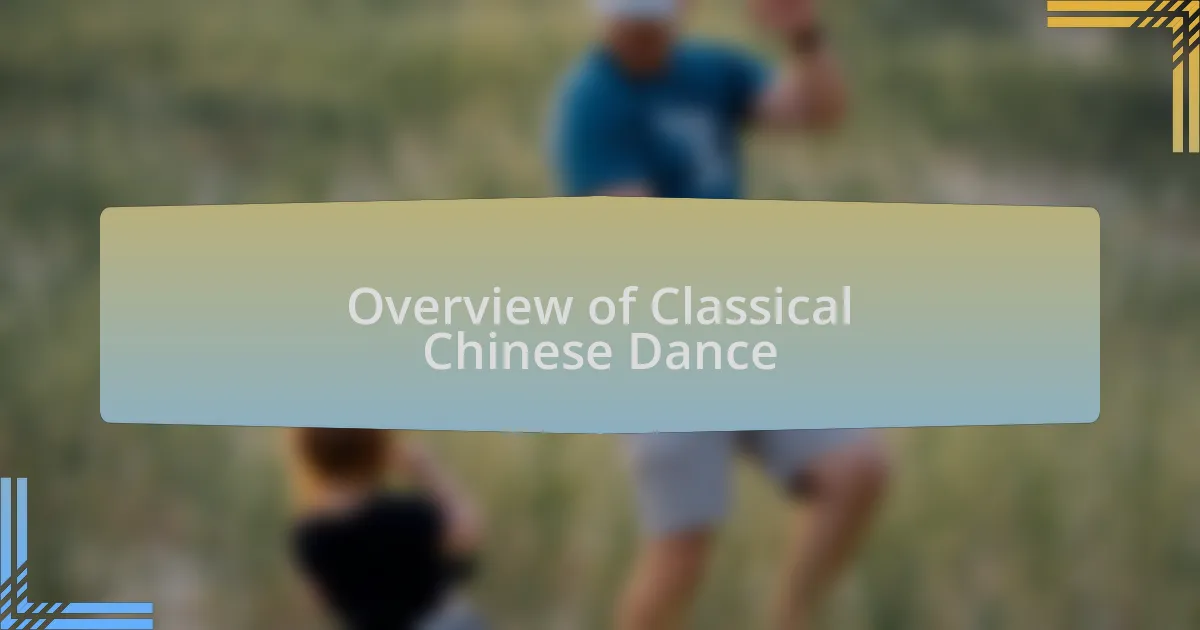
Overview of Classical Chinese Dance
Classical Chinese dance is a rich tapestry that weaves together history, philosophy, and aesthetics. It originated from ancient court and folk dances, embodying the grace and strength of Chinese culture. When I first experienced a performance, I was struck by how the dancers’ movements seemed to tell stories without uttering a single word—each gesture was imbued with meaning and emotion.
One of the most fascinating aspects of this dance form is the use of traditional techniques that have been preserved for centuries. The combination of fluid movements and intricate footwork not only showcases physical prowess but also reflects the underlying principles of Chinese philosophy, such as balance and harmony. I often find myself wondering how the dancers manage to convey such depth of feeling through their physicality. It’s an art that requires a deep understanding of both the body and the spirit.
The costumes used in classical Chinese dance are another element that captivates me. They are often vibrant and elaborate, enhancing the storytelling aspect of the performance. I remember attending a competition where the dancers’ costumes seemed to come alive, shimmering with every movement. This visual beauty amplifies the dance, leaving an indelible impression on the audience. Just think about it—how much do costumes contribute to the overall experience of a performance? In my view, they are an integral part of the story being told.
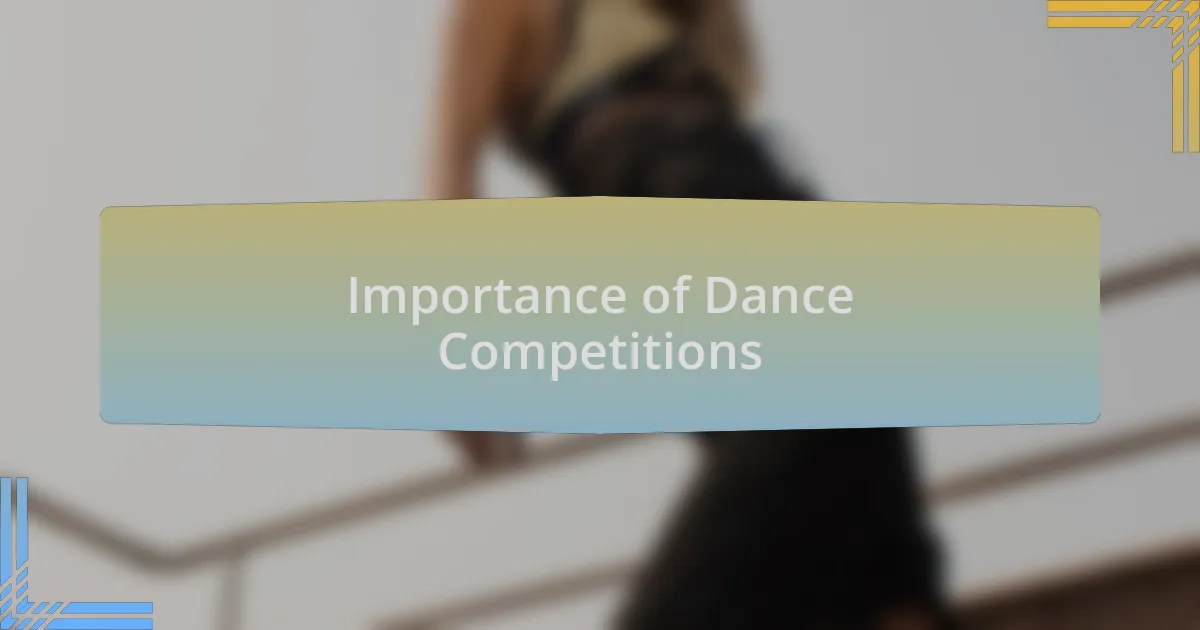
Importance of Dance Competitions
Participating in dance competitions offers dancers an invaluable opportunity for personal growth and skill refinement. I recall a time when I watched a dancer deftly transform her technique after just one competition. The pressure to perform in front of judges pushed her to dig deeper, enhancing her understanding of her own capabilities. Isn’t it fascinating how a competitive environment can ignite such a profound transformation?
Beyond individual development, dance competitions foster a sense of community among dancers. At one event I attended, I was moved by the camaraderie that flourished among competitors. Each dancer offered words of encouragement, turning what could be a stressful experience into one filled with support and shared passion. Have you ever felt that electric connection with others who share your love for an art form? It creates a bond that enriches the dance experience.
Moreover, these competitions serve as a platform to elevate the art of classical Chinese dance. I often think about the way they shine a spotlight on this beautiful heritage, allowing it to reach wider audiences. By showcasing the diversity and richness of our cultural expressions, we ensure that classical Chinese dance continues to thrive for future generations. How important is it to keep these traditions alive? In my opinion, it is essential, and competitions play a crucial role in that mission.
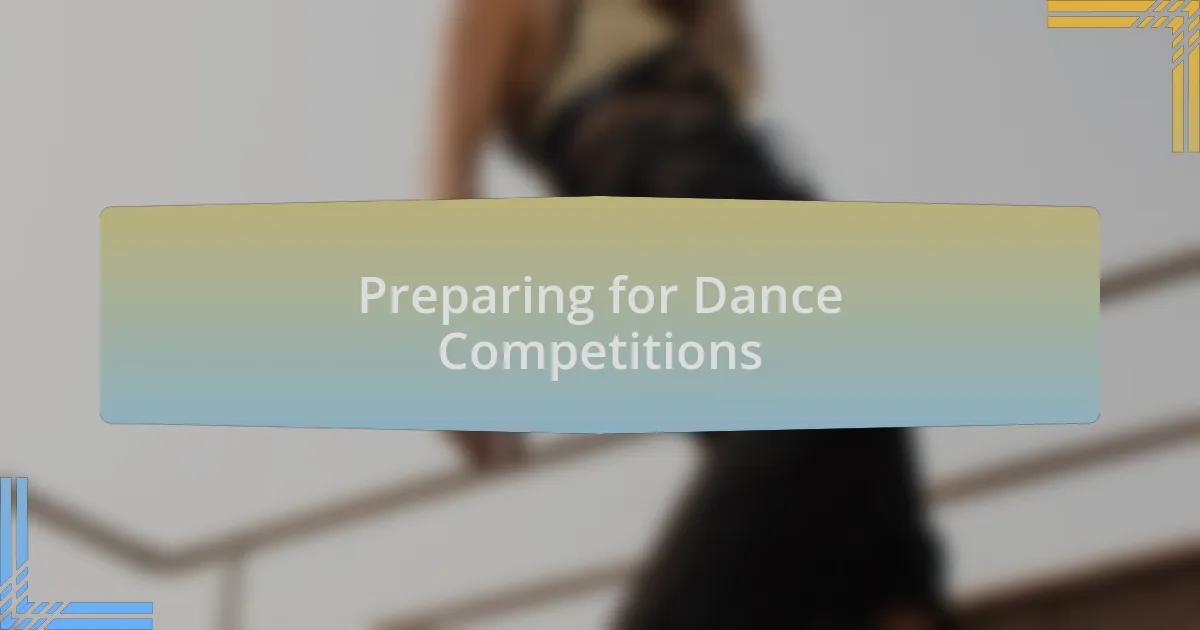
Preparing for Dance Competitions
Preparing for a dance competition requires not just physical readiness but also mental fortitude. I remember leading up to my first major competition; the jitters were intense. To calm my nerves, I developed a routine of visualization. Imagining myself confidently executing each move helped ground me. Have you ever tried visualizing success before a big performance? It truly can be a game changer.
An essential part of preparation is refining your choreography. A dance friend of mine once spent additional hours perfecting her transitions and expressions, and it made a world of difference. The judges not only look for technical precision but also for the emotive storytelling behind each movement. This made me wonder: how can we ensure our performances connect with the audience on a deeper level? Finding that balance is key.
Finally, don’t underestimate the importance of teamwork if you’re part of a group performance. I’ve seen how a well-knit ensemble, united in practice and spirit, creates an atmosphere that elevates each dancer’s performance. Sharing tips, supporting each other’s struggles, and celebrating small victories fuels motivation and camaraderie. Have you ever felt the thrill of being part of something larger than yourself? That shared energy can truly enhance the experience of preparing for competition.
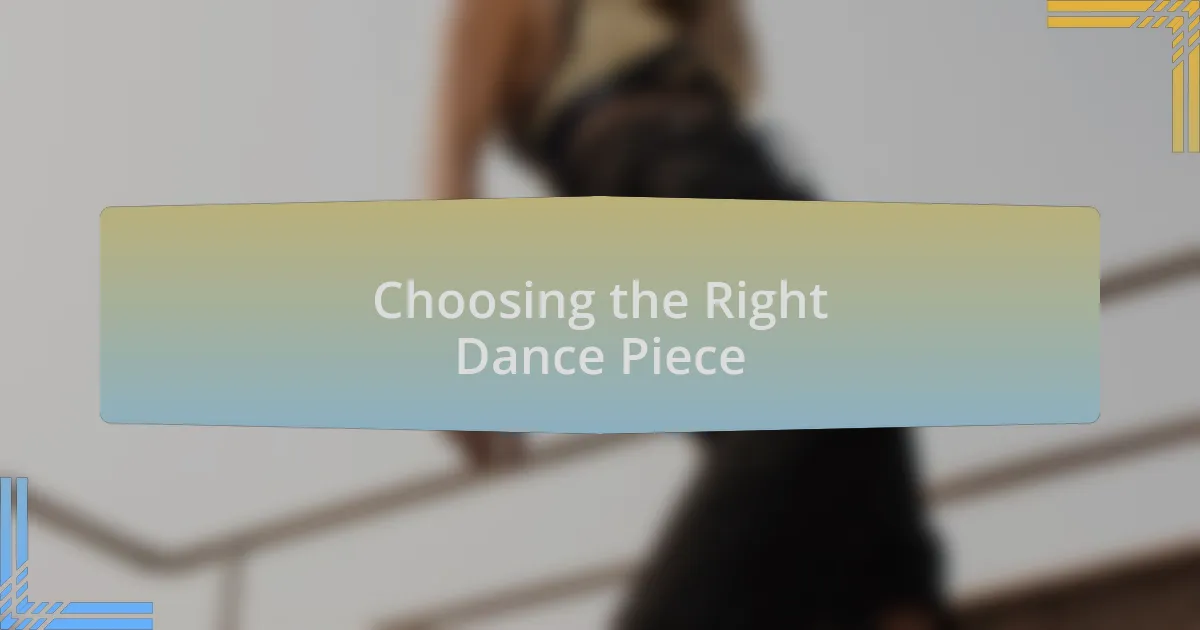
Choosing the Right Dance Piece
Choosing the right dance piece can feel overwhelming, especially with so many options available. I recall staring at a sea of choreographies, uncertain which one would resonate with both me and the judges. After much contemplation, I learned that the piece must not only showcase technical skill but also reflect my unique style and story. Have you ever chosen a song that just felt like it was made for you?
Another factor I consider is the theme and message behind the dance. During one competition, I chose a piece that explored a personal experience of overcoming self-doubt. The emotional impact it had on my performance was palpable; I felt every movement deeply, which, in turn, resonated with the audience. How does the narrative of your dance piece shape your expression? That connection can be the difference between a good performance and a memorable one.
Lastly, I’ve found that the music selection plays a crucial role in setting the tone and energy of my dance. I often listen to my chosen tracks repeatedly, letting the rhythm guide my movements during practice. A powerful piece can ignite passion and energy, while a more subtle selection can evoke grace and intimacy. Have you ever felt the energy shift in a room with just the right music? It’s incredible how the right choice can elevate your entire performance.
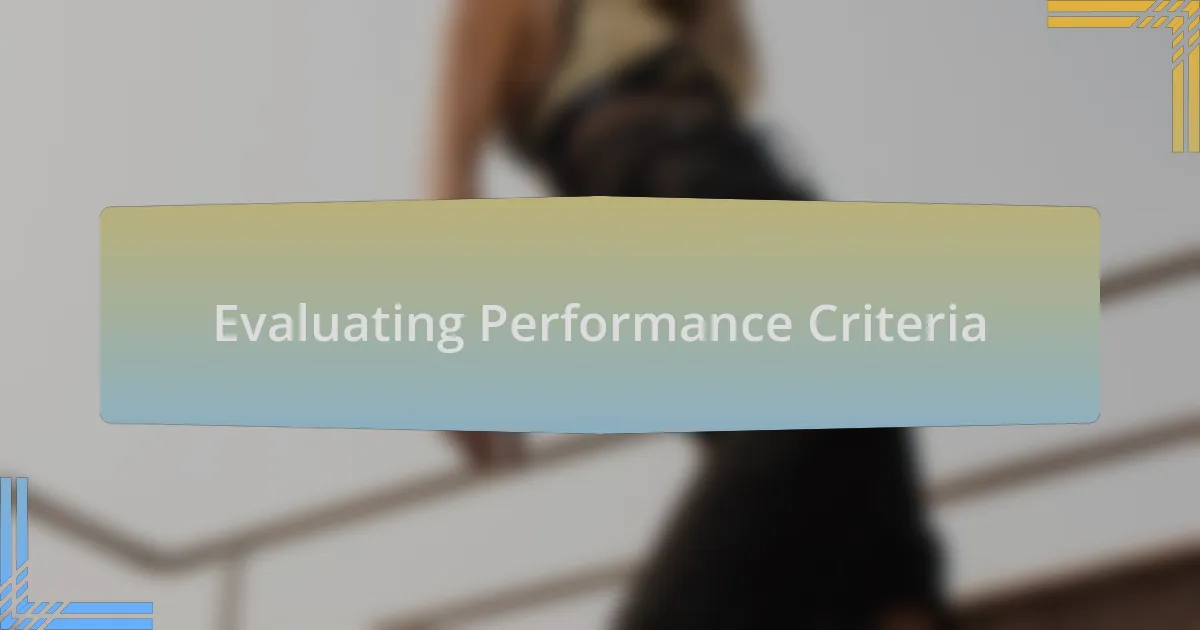
Evaluating Performance Criteria
Evaluating performance criteria in dance competitions goes beyond mere technical skill; it’s about the entire presentation. I recall one competition where I saw a dancer execute flawless movements but fail to connect emotionally, leaving the judges unimpressed despite her precision. Have you ever noticed how a breathtaking spin can halt your breath if the dancer truly embodies the music? That emotional connection often sways the verdict.
Another essential criterion is choreography originality. In one of my own performances, I opted for a piece that combined traditional Chinese elements with a contemporary twist. The judges responded positively, not only because it was visually appealing but also because it showcased my creativity. Isn’t it fascinating how originality can transform a routine from something technically sound into an unforgettable experience?
Finally, the presence and confidence of the performer also play a significant role in evaluation. I remember feeling nervous during my early competitions, which often translated into stiff movements. However, as I gained confidence, I noticed how my body language could command the stage. Have you experienced a shift in performance once you truly embraced your artistry? It’s a game changer when judges can feel your passion from the back row.
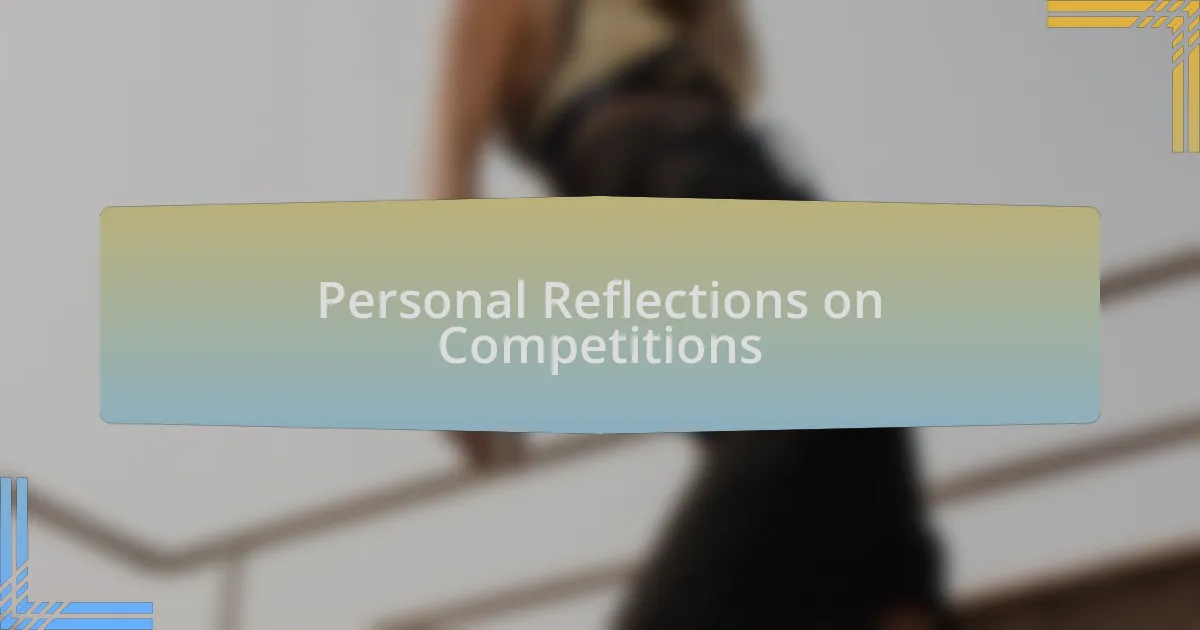
Personal Reflections on Competitions
Competitions have always stirred a mix of excitement and anxiety within me. I remember vividly my first competition, standing backstage, the thumping of my heart drowning out the chatter of fellow dancers. It was in that moment, while silently rehearsing my routine, that I realized how competition amplifies my passion; I wanted to convey something powerful to the audience. Have you ever felt that rush where every nerve in your body tingles with anticipation, and you just know it’s time to shine?
Reflecting on the experiences I’ve had, it strikes me how competitions reveal the various facets of our identities as performers. I once entered a traditional Chinese dance competition clutching a jade pendant, a gift from my grandmother, believing it brought me strength. As I danced, each movement felt infused with her spirit, guiding me to express not just the choreography but my own story. Isn’t it remarkable how a simple item can connect our heritage to our art, and elevate our performance into something deeply personal?
However, I’ve also learned that competition can sometimes breed an unhealthy comparison to others. I recall a moment when watching a fellow dancer excel, I felt a twinge of self-doubt creep in. It was a turning point for me; I started focusing less on how others performed and more on my unique journey. Have you ever caught yourself measuring your worth against someone else’s success? Finding my voice in dance became incredibly liberating, allowing me to appreciate every performance as a step in my own evolving path.
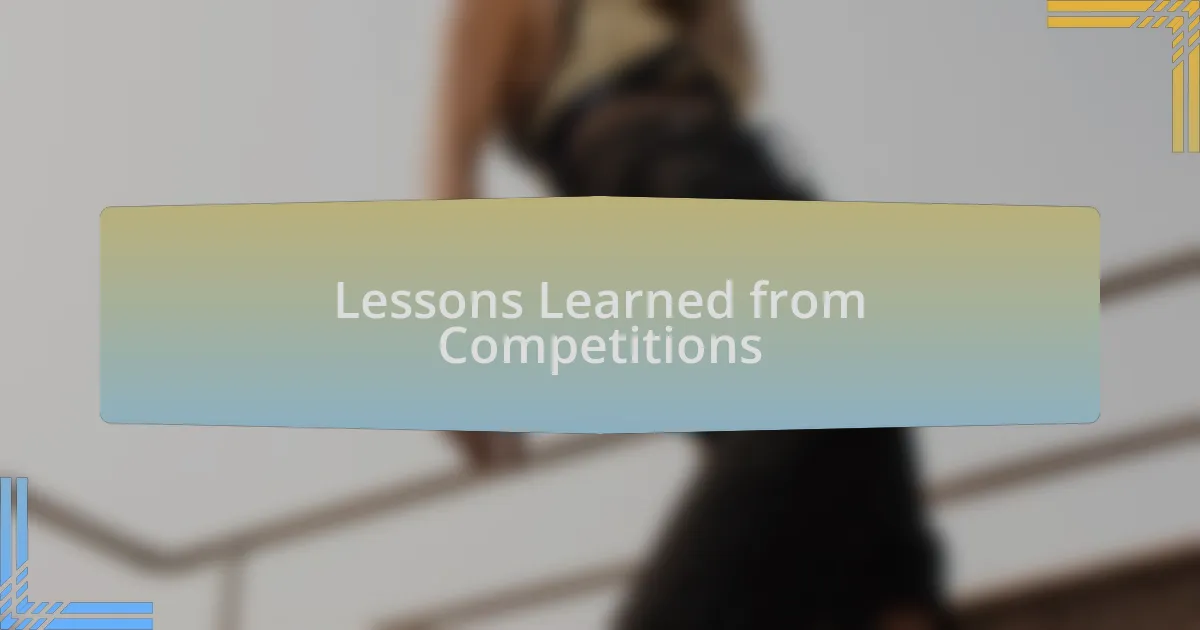
Lessons Learned from Competitions
Competitions have taught me the profound value of resilience. I remember a particularly challenging performance where everything seemed to go wrong—the music skipped, and I lost my place in the routine. Instead of succumbing to embarrassment, I learned to adapt on the spot, improvising my movements. Have you ever had to think on your feet like that? It was empowering to realize that even in moments of chaos, I could reclaim my composure and continue.
I’ve also discovered the importance of preparation and practice. I found that the weeks leading up to a competition were crucial in shaping my performance. With each rehearsal, not only did I refine my technique but I also built a sense of confidence that was almost palpable. Does preparation make a difference in your experience too? It certainly transformed mine, turning nerves into excitement as I stepped onto the stage.
One unexpected lesson was the camaraderie developed among dancers. During one competition, I connected with competitors over our shared passion and struggles, forming friendships that lasted beyond the stage. These moments reminded me that, although we may compete against each other, we are part of a larger community united by our love for dance. Isn’t it interesting how competition can foster connection instead of isolation? This sense of belonging has been a beautiful takeaway from my experiences.